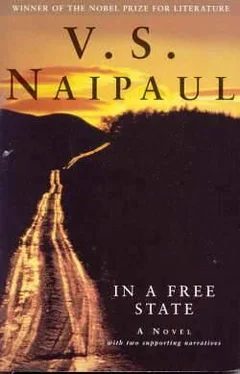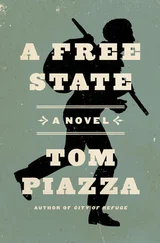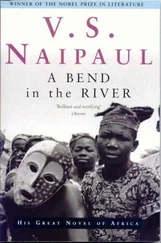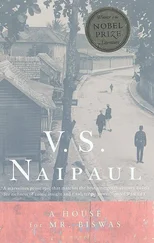Vidiadhar Naipaul - In A Free State
Здесь есть возможность читать онлайн «Vidiadhar Naipaul - In A Free State» весь текст электронной книги совершенно бесплатно (целиком полную версию без сокращений). В некоторых случаях можно слушать аудио, скачать через торрент в формате fb2 и присутствует краткое содержание. Жанр: Современная проза, на английском языке. Описание произведения, (предисловие) а так же отзывы посетителей доступны на портале библиотеки ЛибКат.
- Название:In A Free State
- Автор:
- Жанр:
- Год:неизвестен
- ISBN:нет данных
- Рейтинг книги:5 / 5. Голосов: 1
-
Избранное:Добавить в избранное
- Отзывы:
-
Ваша оценка:
- 100
- 1
- 2
- 3
- 4
- 5
In A Free State: краткое содержание, описание и аннотация
Предлагаем к чтению аннотацию, описание, краткое содержание или предисловие (зависит от того, что написал сам автор книги «In A Free State»). Если вы не нашли необходимую информацию о книге — напишите в комментариях, мы постараемся отыскать её.
«V. S. Naipaul tells stories which show us ourselves and the reality we live in. His use of language is as precise as it is beautiful.» – The London Times
«A Tolstoyan spirit…The so-called Third World has produced no more brilliant literary artist.» – John Updike, The New Yorker
«The coolest literary eye and the most lucid prose we have.» – The New York Review
In A Free State — читать онлайн бесплатно полную книгу (весь текст) целиком
Ниже представлен текст книги, разбитый по страницам. Система сохранения места последней прочитанной страницы, позволяет с удобством читать онлайн бесплатно книгу «In A Free State», без необходимости каждый раз заново искать на чём Вы остановились. Поставьте закладку, и сможете в любой момент перейти на страницу, на которой закончили чтение.
Интервал:
Закладка:
There was no coin in Egypt that year, only paper money. All foreign currencies went far; and Luxor, in recent imperial days a winter resort of some style, was accommodating itself to simpler tourists. At the Old Winter Palace Hotel, where fat Negro servants in long white gowns stood about in the corridors, they told me they were giving me the room they used to give the Aga Khan. It was an enormous room, overfurnished in a pleasing old-fashioned way. It had a balcony and a view of the Nile and low desert hills on the other bank.
In those hill were the tombs. Not all were of kings and not all were solemn. The ancient artist, recording the life of a lesser personage, sometimes recorded with a freer hand the pleasures of that life: the pleasures of the river, full of fish and birds, the pleasures of food and drink. The land had been studied, everything in it categorized, exalted into design. It was the special vision of men who knew no other land and saw what they had as rich and complete. The muddy Nile was only water: in the paintings, a blue-green chevron: recognizable, but remote, a river in fairyland.
It could be hot in the tombs. The guide, who was also sometimes the watchman, crouched and chattered in Arabic, earning his paper piastres, pointing out every symbol of the goddess Hathor, rubbing a grimy finger on the paintings he was meant to protect. Outside, after the darkness and the bright visions of the past, there was only rubbled white sand; the sunlight stunned; and sometimes there were beggar boys in jibbahs.
To me these boys, springing up expectandy out of rock and sand when men approached, were like a type of sand animal. But my driver knew some of them by name; when he shooed them away it was with a languid gesture which also contained a wave. He was a young man, the driver, of the desert himself, and once no doubt he had been a boy in a jibbah. But he had grown up differently. He wore trousers and shirt and was vain of his good looks. He was reliable and correct, without the frenzy of the desert guide. Somehow in the desert he had learned boredom. His thoughts were of Cairo and a real job. He was bored with the antiquities, the tourists and the tourist routine.
I was spending the whole of that day· in the desert, and now it was time for lunch. I had a Winter Palace lunch-box, and I had seen somewhere in the desert the new government rest-house where tourists could sit at tables and eat their sandwiches and buy coffee. I thought the driver was taking me there. But we went by unfamiliar ways to a little oasis with palm trees and a large, dried-up timber hut. There were no cars, no minibuses, no tourists, only anxious Egyptian serving-people in rough clothes. I didn't want to stay. The driver seemed about to argue, but then he was only bored. He drove to the new rest-house, set me down and said he would come back for me later.
The rest-house was crowded. Sunglassed tourists, exploring their cardboard lunch-boxes, chattered in various European languages. I sat on the terrace at a table with two young Germans. A brisk middle-aged Egyptian in Arab dress moved among the tables and served coffee. He had a camel-whip at his waist, and 'I saw, but only slowly, that for some way around the rest-house the hummocked sand was alive with little desert children. The desert was clean, the air was clean; these children were very dirty.
The rest-house was out of bounds to them. When they came close, tempted by the offer of a sandwich or an apple, the man with the camel-whip gave a camel-frightening shout. Sometimes he ran out among them, beating the sand with his whip, and they skittered away, thin litde sand-smoothed legs frantic below swinging jibbahs. There was no rebuke for the tourists who had offered the food; this was an Egyptian game with Egyptian rules.
It was hardly a disturbance. The young Germans at my table paid no attention. The English students inside the rest-house, behind glass, were talking competitively about Carter and Lord Carnarvon. But the middle-aged Italian group on the terrace, as they understood the rules of the game, became playful. They threw apples and made the children run far. Experimentally they broke up sandwiches and threw the pieces out onto the sand; and they got the children to come up quite close. Soon it was all action around the Italians; and the man with the camel-whip, like a man understanding what was required of him, energetically patrolled that end of the terrace, shouting, beating the sand, earning his paper piastres.
A tall Italian in a cerise jersey stood up and took out his camera. He laid out food just below the terrace and the children came running. But this time, as though it had to be real for the camera, the camel-whip fell not on sand but on their backs, with louder, quicker camel-shouts. And still, among the tourists in the rest-house and among the Egyptian drivers standing about their cars and minibuses, there was no disturbance. Only the man with the whip and the children scrabbling in the sand were frantic. The Italians were cool. The man in the cerise jersey was opening another packet of sandwiches. A shorter, older man in a white suit had stood up and was adjusting his camera. More food was thrown out; the camel-whip continued to fall; the shouts of the man with the whip turned to resonant grunts.
Still the Germans at my table didn't notice; the students inside were still talking. I saw that my hand was trembling. I put down the sandwich I was eating on the metal table; it was my last decision. Lucidity, and anxiety, came to me only when I was almost on the man with the camel-whip. I was shouting. I took the whip away, threw it on the sand. He was astonished, relieved. I said, 'I will report this to Cairo.' He was frightened; he began to plead in Arabic. The children were puzzled; they ran off a little way and stood up to watch. The two Italians, fingering cameras, looked quite calm behind their sunglasses. The women in the party leaned back in their chairs to consider me.
I felt exposed, futile, and wanted only to be back at my table.
When I got back I took up my sandwich. It had happened quickly; there had been no disturbance. The Germans stared at me. But I was indifferent to them now as I was indifferent to the Italian in the cerise jersey. The Italian women had stood up, the group was leaving; and he was ostentatiously shaking out lunch-boxes and sandwich wrappers onto the sand.
The children remained where they were. The man from whom I had taken the whip came to give me coffee and to plead again in Arabic and English. The coffee was free; it was· his gift to me. But even while he was talking the children had begun to come closer. Soon they would be back, raking the sand for what they had seen the Italian throw out.
I didn't want to see that. The driver was waiting, leaning against the car door, his bare arms crossed. He had seen all that had happened. From him, an emancipated young man of the desert in belted trousers and sports shirt, with his thoughts of Cairo, I was expecting some gesture, some sign of approval. He smiled at me with the corners of his wide mouth, with his narrow eyes. He crushed his cigarette in the sand and slowly breathed out smoke through his lips; he sighed. But that was his way of smoking. I couldn't tell what he thought. He was as correct as before, he looked as bored.
Everywhere I went that afternoon I saw the pea-green Volkswagen minibus of the Italian group. Everywhere I saw the cerise jersey. I learned to recognize the plump, squiffy, short-stepped walk that went with it, the dark glasses, the receding hairline, the little stiff swing of the arms. At the ferry I thought I had managed to escape; but the minibus arrived, the Italians got out. I thought we would separate on the Luxor bank. But they too were staying at the Winter Palace. The cerise jersey bobbed confidently through bowing Egyptian servants in the lobby, the bar, the grand dining-room with fresh flowers and intricately folded napkins. In Egypt that year there was only paper money.
Читать дальшеИнтервал:
Закладка:
Похожие книги на «In A Free State»
Представляем Вашему вниманию похожие книги на «In A Free State» списком для выбора. Мы отобрали схожую по названию и смыслу литературу в надежде предоставить читателям больше вариантов отыскать новые, интересные, ещё непрочитанные произведения.
Обсуждение, отзывы о книге «In A Free State» и просто собственные мнения читателей. Оставьте ваши комментарии, напишите, что Вы думаете о произведении, его смысле или главных героях. Укажите что конкретно понравилось, а что нет, и почему Вы так считаете.











